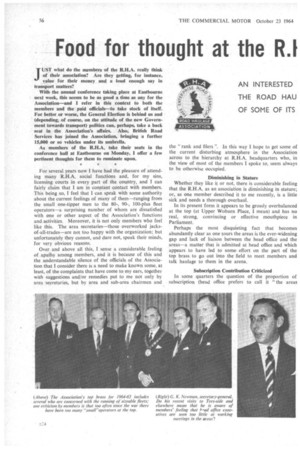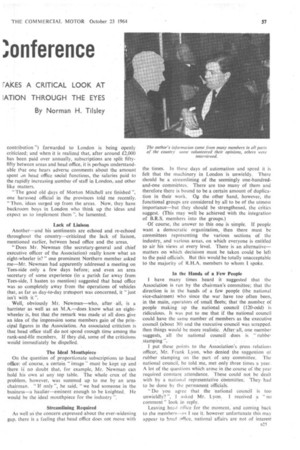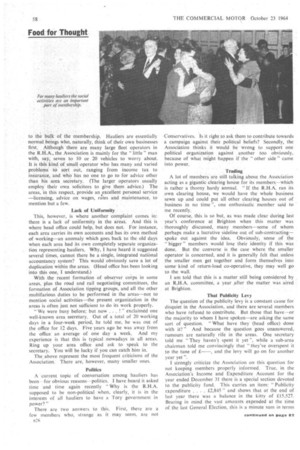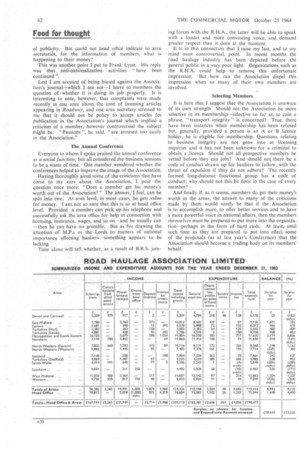Food for thought at the R.I inference
Page 58

Page 59

Page 60

Page 64

If you've noticed an error in this article please click here to report it so we can fix it.
JUST what do the members of the R.H.A. really think of their association? Are they getting, for instance, value for their money and a loud enough say in transport matters?
With the annual conference taking place at Eastbourne next week, this seems to be as good a time as any for the Association—and I refer in this context to both the members and the paid officials—to take stock of itself. For better or worse, the General Election is behind us and (depending, of course, on the attitude of the new Government towards transport) politics can, perhaps, take a back seat in the Association's affairs. Also, British Road Services has joined the Association, bringing a further 15,000 or so vehicles under its umbrella.
As members of the R.H.A. take their seats in the conference hall at Eastbourne on Monday, I offer a few pertinent thoughts for them to ruminate upon.
For several years now I have had the pleasure of attending many R.H.A. social functions and, for my sins, licensing courts in every part of the country, and I can fairly claim that I am in constant contact with members. This being so, I feel that I can speak with some authority about the current feelings of many of them—ranging from the small one-tipper men to the 80-, 90-, I00-plus fleet operators—a surprising number of whom are dissatisfied with one or other aspect of the Association's functions and activities. Moreover, it is not only members who feel like this. The area secretaries—those overworked jacksof-all-trades—are not too happy with the organization; but unfortunately they cannot, and dare not, speak their minds, for very obvious reasons.
Over and above all this, I sense a considerable feeling of apathy among members, and it is because of this and the understandable silence of the officials of the Association that I consider there is a need to make known some, at least, of the complaints that have come to my ears, together with suggestions and/or remedies put to me not only by area secretaries, but by area and sub-area chairmen and
the "rank and filers ". In this way I hope to get some of the current disturbing atmosphere in the Association across to the hierarchy at R.H.A. headquarters who, in the view of most of the members I spoke to, seem always to be otherwise occupied.
Diminishing in Stature Whether they like it or not, there is considerable feeling that the R.H.A. as an association is diminishing in stature; or, as one member described it to me recently, is a little sick and needs a thorough overhaul.
In its present form it appears to be grossly overbalanced at the top (at Upper Woburn Place, I mean) and has no real, strong, convincing or effective mouthpiece in Parliament.
Perhaps the most disquieting fact that becomes abundantly clear as one tours the areas is the ever-widening gap and lack of liaison between the head office and the areas—a matter that is admitted at head office and which appears to have led to some effort on the part of the top brass to go out into the field to meet members and talk haulage to them in the arena.
Subscription Contribution Criticized In some quarters the question of the proportion of subscription (head office prefers to call it "the areas contribution ") forwarded to London is being openly criticized; and when it is realized that, after around £2,000 has been paid over annually, subscriptions are split fiftyfifty between areas and head office, it is perhaps understandable that one hears adverse comments about the amount spent on head office social functions, the salaries paid to the rapidly increasing number of staff in London, and other like matters.
The good old days of Morton Mitchell are finished ", one harassed official in the provinces told me recently. "Then, ideas surged up from the areas. Now, they have backroom boys in London who think up the ideas and expect us to implement them ", he lamented.
Lack of Liaison Another—and his sentiments are echoed and re-echoed throughout the country—criticized the lack of liaison, mentioned earlier, between head office and the areas.
"Does Mr. Newman (the secretary-general and chief executive officer of the Association) really know what an eight-wheeler is?" one prominent Northern member asked me—Mr. Newman had apparently addressed a meeting on Tees-side only a few days before; and even an area secretary of some experience (in a parish far away from Tees-side, I hasten to mention) suggested that head office was so completely away from the operations of vehicles that, as far as day-to-day transport was concerned, it "just isn't with it ".
Well, obviously Mr. NeWman—who, after • all; is a barrister as well as an M.A.—does know what an eightwheeler is, but that the remark was made at all does give an idea of the impression some members gain of the principal figures in the Association. An associated criticism is that head office staff do not spend enough time among the rank-and-file members. If they did, some of the criticisms would immediately be dispelled.
The Ideal Mouthpiece On the question of proportionate subscriptions to head office: of course, a certain "image " must be kept up and there no doubt that, for example, Mr. Newman can hold his own at any top table. The whole crux of the • problem, however, was summed up to me by an area chairman. "If only ", he said, "we had someone in the business—a haulier—eminent enough to be knighted. He would be the ideal mouthpiece for the industry ".
Streamlining Required As well as the concern expressed about the ever-widening gap, there is a feeling that head office does not move with the times. In these days of automation and speed it is felt that the machinery in London is unwieldy. There should be a streamlining of the seemingly one-hundredand-one committees. There are too many of them and therefore there is bound to be a certain amount of duplication in their work. Op the other hand, however, the functional groups are considered by all to be of the utmost importance—but they should be strengthened, the critics suggest. (This may well be achieved with the integration of B.R.S. members into the groups.) Of course, the answer to this one is simple. If people want a democratic organization, then there must be committees representing the various sections of the industry, and various areas, on which everyone is entitled to air his views at every level. There is an alternative— matters on which decisions must be taken could be left to the Paid officials. But this would be totally unacceptable to the majority of R.H.A. members to whom I spoke.
In the Hands of a Few People I have many times heard it suggested that the Association is run by the chairman's committee; that the direction is in the hands of a few people (the national vice-chairmen) who since. the •war have too often been, in the main,, operators of small fleets; that the .number of people making up the national council (120-odd) is ridiculous. It was put to me thatif the national .council could have the same number of membersas the executive council. (about 30) and the executive council was.-. scrapped. then things would be more realistic. After all, one member -suggests, all the national council does is " rubbee stamping ".
I put -these points to the Association's, press relations officer; Mr. Frank Lyon, who denied the suggestion of rubber stamping on the part of .any. committee. The national council, he told me, met only three times a year. A lot of the questions which arose in the course of the year required Constant attendance. These could not be dealt with by a national representative COrinfiittee, 'They had to be done by the permanent Officials:
"Po you agree that the 'national council is too unwieldly? ", I asked Mr. Lyon. I received a "no comment" look in reply.
Leaving heed aft-ace for the moment, and coming hack to the members—Ps i see it, however unfortunate this may appear to bead office. national affairs are not of interest a25 to the bulk of the membership. Hauliers are essentially normal beings who, naturally, think of their own businesses first. Although there are many large fleet operators in the R.H.A., the Association is mainly for the " little " man with, say, seven to 10 or 20 vehicles to worry about. It is this kind of small:operator who has many and varied problems to sort out, ranging from income tax to insurance, and who has no one to go to for advice other than his area secretary. (The larger operators usually employ their own solicitors to give them advice.) The areas, in this respect, provide an excellent personal service —licensing, advice on wages, rates and maintenance, to mention but a few.
Lack of Uniformity This, however, is where another coniplaint comes in: there is a lack of uniformity in the areas. And this is where head office could help, but does not. For instance, each area carries its own accounts and has its own method of working—an anomaly which goes back to the old days when each area had its own completely separate organization representing hauliers. Why, 1 have heard it suggested several times, cannot there be a single, integrated natiOnal accountancy system? This would obviously save a lot of duplication within the areas. (Head office has been looking into this one, I understand.) With the recent formation of observer corps in some areas, plus the road and rail negotiating committees, the formation of Association tipping groups, and all the other multifarious duties to be performed in the areas—not to mention social activities—the present organization in the areas is often just not stifficient to do its work properly.
"We were busy before; but now .. . " exclaimed one well-known area secretary. Out of a total of 20 working days in a four-week period, he told me, he was out of the office for 12 days. Five years ago he was away from the office an average of one day a week. And my experience is that this is typical ,nowadays in all areas. Ring up your area office and ask to speak to the secretary. You will be lucky if you can catch him in.
The above represent the most frequent criticisms of the Association. There are, however, many smaller ones.
Politics A current topic of conversation among hauliers has been---for obvious reasons—politics. I have heard it asked time and time again recently "Why. is the R.H.A. supposed to be non-political when, clearly, it is in the interests of all hauliers to have a Tory government in power?"
There are two answers to this. First, there are a few members who, strange as it may seem, are not n26 Conservatives. Is it right to ask them to contribute towards a campaign against their political beliefs? Secondly, the Association thinks it would be wrong to support one political organization against another too obviously, because of what might happen if the " other side" came into power.
Trading
A lot of members are still talking about the Association acting as a gigantic clearing house for its members—which is rather a thorny hardy annual. "If the RB.A. ran its own clearing house, we would have the whole business sewn up and could put all other clearing houses out of .business in no time ", one enthusiastic member said to me recently.
Of course, this is so but, as was made clear during last year's conference at Brighton when this matter was thoroughly discussed, many members—some of whom perhaps make a lucrative sideline out of subcontracting— spoke out against the idea. Obviously, some of the " bigger " members .would lose their identity if this was done. But the converse is the case where the smaller operator is concerned, and it is generally felt that unless the smaller men get together and form themselves into. some kind of return-load co-operative, they may well go to the wall. •.
I am told that this is a matter still being considered by . an R,H.A. committee, a year after the matter was aired . at Brighton.
That Publicity Levy The question of the publicity levy is a constant cause for disquiet in the Association, and there are several members who have refused to contribute. But those that have—or the majority to whom 1 have spoken—are asking the same sort of question. "What have they (head office) done with it?" And because the question goes unanswered, rumours are naturally rife in the areas. One secretary told me "They haven't spent it yet ", while a sub-area chairman told me convincingly that "they've overspent it to the tune of £ , and the levy will go on for another year yet ".
I strongly criticize the Association on this question for not keeping members properly informed. True, in the Association's Income and Expenditure Account for the year ended December 31 there is a special section devoted to the publicity fund. This carries an item: "Publicity expenditure . . . £2,845 and shows that at the end of last year there was a balance in the kitty of £15,527. Bearing in mind the vast amounts expended at the time of the last General Election, this is a minute sum in terms of publicity. But could not head office indicate to area secretaries, for the information of members, what is happening to their money?
This was another point I put to Frank Lyon. His reply was that anti-nationalization activities "have been continued ".
Lest I am accused of being biased against the Association's journal-which I am not-I leave to members the question of whether it is doing its job properly. It is interesting to note, however, that complaints were made recently in one area about the tone of licensing articles appearing in Roadway, and one area secretary stressed to me that it should not be policy to accept articles for publication in the Association's journal which implied a criticism of a member, however controversial the subject might be. "Passions ", he said, "are aroused too easily in the Association."
The Annual Conference
Everyone to whom I spoke praised the annual conference as a social function; but all considered the business sessions to be a waste of time. One member wondered whether the conferences helped to improve the image of the Association.
Having thoroughly aired some of the criticisms that have come to my ears about• the Association, I pose the question once more: "Does a member get his money's worth out of the Association?" The answer, I feel, can be split into two. At area level, in most cases, he gets value for money. f am not so sure that this is so at head office level. Provided a member can pick up his telephone and successfully ask the area office for help in connection with licensing, insurance, wages, and so on-and he usually can -then he can have no grumble. But as for drawing the attention of M.P.s or the Lords to matters of national importance affecting hauliers-something appears to be lacking.
Time alone will tell whether, as a result of B.R.S. join ing forces with the R.H.A., the latter will be able to speak with a louder and more convincing voice, and demand greater respect than it does at the moment.
It is in this connection that I raise my last, and to my mind most controversial, point. In recent months the road haulage industry has been depicted before the general public in a very poor light. Organizations such as the R.H.A. could help to remove this unfortunate impression. But bow can the Association dispel this impression when so many of their own members are involved.
Selecting Members It is here that I suggest that the Association is unaware of its own strength Should not the Association be more selective in its membership-selective so far as, to coin a phrase, "transport integrity " is concerned? True, there have been instances when membership has been refused but, generally, provided a person is an A or B licence holder, he is eligible for membership. Questions relating to business integrity are not gone into at licensing inquiries and it has not been unknown for a criminal to obtain a licence Should not all prospective members be vetted before they can join? And should not there be a code of conduct drawn up for hauliers to follow, with the threat of expulsion if they do not adhere? The recently formed long-distance functional group has a code of conduct: why should not this be done in the ease of every member'?
And finally if, as it seems, members do get their money's worth in the areas, the answer to many of the criticisms made by them would surely be that if the Association is to accomplish more, to offer better services and to have a more powerful voice in national affairs, then the members themselves must be prepared to put more into the organization-perhaps in the form of hard cash. At least, until such time as they are prepared to put into effect some of the proposals (as at last year's Conference) that the Association should become a trading body on its members' behalf.




















































































































